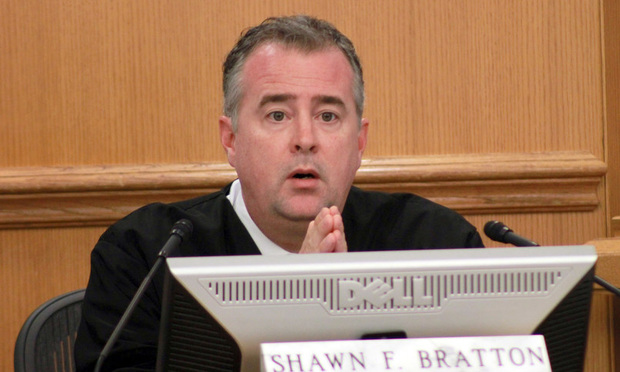Plaintiffs' Counsel Defend Judge in Contentious Ford Roof Crush Case
The latest development is a defense of Gwinnett County State Court Judge Shawn Bratton, who was the subject of a motion for recusal from Ford accusing him of bias, unfairness and one-sided rulings.
May 11, 2018 at 04:50 PM
7 minute read

Filings continued this week in an escalating battle over a roof crush case against Ford Motor Co. that ended in a mistrial last month.
The latest development is a defense of Gwinnett County State Court Judge Shawn Bratton, who was the subject of a motion for recusal from Ford accusing him of bias, unfairness and one-sided rulings.
“Ford's motion to recuse is nothing but a desperate attempt to avoid the consequences of Ford's willful violations of this court's orders,” the company's opposing counsel said in the introduction to the response. “Ford's scorched-earth 'defense' has been and continues to be based on defying court orders and making venomous attacks on anyone and everyone who dares to hold Ford accountable for its misconduct. After personally attacking plaintiffs, plaintiffs' counsel, and plaintiffs' witnesses, Ford has now turned its sights on the court.”
In the highly contentious three-week trial, the surviving sons of Melvin and Voncile Hill, Kim and Adam, alleged that the F-250 pickup roof killed their parents in a rollover crash because it was weak and could have been improved for a cost of $100.
The Hills' lawyers asserted that Ford's attempt to recuse the judge has no legal basis and is a calculated strategy aimed at appeal options and public relations.
“The reason Ford filed its baseless motion to recuse could not be more transparent. Ford's preemptive attack on the court is calculated to set up a later argument that any order sanctioning Ford was 'in retaliation' for the filing of Ford's motion. Ford surely knows severe sanctions are mandated. Ford's attempt to evade the consequences of its defiance of court orders and to intimidate those charged with dispensing justice is disgraceful,” the Hills' lawyers said.
“Ford's motion to recuse is nothing but a last ditch effort by a desperate party with no defense to avoid the consequences of its deliberate misconduct and defiance of court orders,” the Hills' legal team concluded in a 30-page response. “Ford's 'motion' was not meant for the courts at all, but for the press. Ford can't win in court—it has no defense and its conduct has been despicable, so Ford is trying to 'spin' the press.”
The Hills' lead counsel is Jim Butler of Butler Wooten & Peak. Butler has won verdicts in excess of $100 million in product liability cases against General Motors and Chrysler. His legal team includes Gerald Davidson Jr. of Mahaffey Pickens Tucker in Lawrenceville, who worked with Butler in a 1993 trial against GM when a jury awarded $105 million to the parents of Shannon Moseley. That verdict—which included $101 million in punitive damages—was later overturned, and the case settled before it was tried again.
The Butler team also includes David Rohwedder of the Butler Wooten firm, based in Columbus and Atlanta. Rohwedder was on Butler's trial team for the parents of 4-year-old Remi Walden against Fiat Chrysler. They won a $150 million verdict, which the judge reduced to a $40 million award. The Georgia Supreme Court upheld the Walden judgment just before the Hill trial started. Brandon Peak, Christopher McDaniel and Ramsey Prather of Butler Wooten are also on the team, as is Michael Gray of Walker, Hulbert, Gray & Moore in Perry.
The Ford team fired back with a reply repeating the call for the judge to step aside.
“For all its bluster, plaintiffs' response does nothing to undermine the legal sufficiency of Ford's Motion to Recuse. Because the Motion is concededly timely, supported by a proper affidavit, and provides a factual basis for recusal, the only proper course is for Judge Bratton to cease taking further action, transfer the Motion to another judge, and for that transferee judge to hold an evidentiary hearing and order Judge Bratton recused from this matter,” the Ford team said in a reply in further support of the motion to recuse.
“Plaintiffs' response also does nothing to undercut the basis for Judge Bratton's recusal: his intercession to provide plaintiffs' counsel Jim Butler a procedural way to obtain the ability to move to strike Ford's answer—something Mr. Butler had been struggling for days to achieve on his own. Judge Bratton's provision of a lifeline, in the form of improper legal advice, to plaintiffs would cause the reasonable observer to question the impartiality of Judge Bratton. Given this, Judge Bratton's recusal is compelled by the Code of Judicial Conduct,” Ford alleged.
The Ford lawyers also repeated accusations that Butler made discriminatory comments. Ford alleged Buter was: sexist because he said young lawyers would like to keep a prospective juror who happened to be a Hawks cheerleader; racist because he asked a juror if he was from India, country of origin of the Ford corporate representative; and anti-disabled because he argued against keeping a blind juror.
“Plaintiffs' counsel does not even attempt to defend their own manifestations of prejudice that Judge Bratton permitted and condoned,” Ford said in its conclusion. “That is because their conduct is indefensible. Plaintiffs' counsel brazenly injected the trial with race-based, sex-based, and disability-based prejudices.”
Butler's team filed a surreply to the Ford reply on Thursday.
“Ford's reply is too filled with falsehoods to address them all. But the second sentence is an example: Ford states that its 'Motion is concededly timely, supported by a proper affidavit, and provides a factual basis for recusal,'” the Hill lawyers answered. “Plaintiffs have conceded no such things.”
The Hill team said “only one of the things Ford complains about is timely—events on April 5-6.” Ford missed the legal deadline on many other complaints, some by years, the Hill lawyers asserted.
Ford's lead counsel is D. Alan Thomas of Huie Fernambucq & Stewart in Birmingham, working with Paul Malek of his firm. Their team includes Michael Eady of Thompson Coe Cousins & Irons of Austin, Texas. Their Atlanta lawyers are Michael Boorman and Philip Henderson of Huff, Powell & Bailey and J. Randolph Evans of Dentons.
All those names appear on the motion to recuse Bratton. Along with it, Boorman filed a supporting affidavit.
Boorman's affidavit provided a summary of the company's defense. “While Ford did not dispute that it could have made a stronger roof, it did dispute that the F-250 Super Duty roof was weak,” Boorman said. “Further, field data and testing has proven that making a strong roof stronger will not make a vehicle 'injury proof' in severe rollover crashes.”
Butler's team charged that the Boorman affidavit was filled with false statements “which are at this point procedurally legally irrelevant” as well as “legally insufficient.”
The Hill team urged Bratton to deny the recusal request—saying the court has not only the authority but the responsibility to stand up against judge shopping. The Hills urged the judge to set a new trial date as soon as possible—after sanctioning Ford for misconduct.
The case is Hill v. Ford, No. 16 C 04179-2.
This content has been archived. It is available through our partners, LexisNexis® and Bloomberg Law.
To view this content, please continue to their sites.
Not a Lexis Subscriber?
Subscribe Now
Not a Bloomberg Law Subscriber?
Subscribe Now
NOT FOR REPRINT
© 2025 ALM Global, LLC, All Rights Reserved. Request academic re-use from www.copyright.com. All other uses, submit a request to [email protected]. For more information visit Asset & Logo Licensing.
You Might Like
View All
A Plan Is Brewing to Limit Big-Dollar Suits in Georgia—and Lawyers Have Mixed Feelings
10 minute read
On The Move: Kilpatrick Adds West Coast IP Pro, Partners In Six Cities Join Nelson Mullins, Freeman Mathis
6 minute read

Did Ahmaud Arbery's Killers Get Help From Glynn County DA? Jury Hears Clashing Accounts
Trending Stories
- 1Gunderson Dettmer Opens Atlanta Office With 3 Partners From Morris Manning
- 2Decision of the Day: Court Holds Accident with Post Driver Was 'Bizarre Occurrence,' Dismisses Action Brought Under Labor Law §240
- 3Judge Recommends Disbarment for Attorney Who Plotted to Hack Judge's Email, Phone
- 4Two Wilkinson Stekloff Associates Among Victims of DC Plane Crash
- 5Two More Victims Alleged in New Sean Combs Sex Trafficking Indictment
Who Got The Work
J. Brugh Lower of Gibbons has entered an appearance for industrial equipment supplier Devco Corporation in a pending trademark infringement lawsuit. The suit, accusing the defendant of selling knock-off Graco products, was filed Dec. 18 in New Jersey District Court by Rivkin Radler on behalf of Graco Inc. and Graco Minnesota. The case, assigned to U.S. District Judge Zahid N. Quraishi, is 3:24-cv-11294, Graco Inc. et al v. Devco Corporation.
Who Got The Work
Rebecca Maller-Stein and Kent A. Yalowitz of Arnold & Porter Kaye Scholer have entered their appearances for Hanaco Venture Capital and its executives, Lior Prosor and David Frankel, in a pending securities lawsuit. The action, filed on Dec. 24 in New York Southern District Court by Zell, Aron & Co. on behalf of Goldeneye Advisors, accuses the defendants of negligently and fraudulently managing the plaintiff's $1 million investment. The case, assigned to U.S. District Judge Vernon S. Broderick, is 1:24-cv-09918, Goldeneye Advisors, LLC v. Hanaco Venture Capital, Ltd. et al.
Who Got The Work
Attorneys from A&O Shearman has stepped in as defense counsel for Toronto-Dominion Bank and other defendants in a pending securities class action. The suit, filed Dec. 11 in New York Southern District Court by Bleichmar Fonti & Auld, accuses the defendants of concealing the bank's 'pervasive' deficiencies in regards to its compliance with the Bank Secrecy Act and the quality of its anti-money laundering controls. The case, assigned to U.S. District Judge Arun Subramanian, is 1:24-cv-09445, Gonzalez v. The Toronto-Dominion Bank et al.
Who Got The Work
Crown Castle International, a Pennsylvania company providing shared communications infrastructure, has turned to Luke D. Wolf of Gordon Rees Scully Mansukhani to fend off a pending breach-of-contract lawsuit. The court action, filed Nov. 25 in Michigan Eastern District Court by Hooper Hathaway PC on behalf of The Town Residences LLC, accuses Crown Castle of failing to transfer approximately $30,000 in utility payments from T-Mobile in breach of a roof-top lease and assignment agreement. The case, assigned to U.S. District Judge Susan K. Declercq, is 2:24-cv-13131, The Town Residences LLC v. T-Mobile US, Inc. et al.
Who Got The Work
Wilfred P. Coronato and Daniel M. Schwartz of McCarter & English have stepped in as defense counsel to Electrolux Home Products Inc. in a pending product liability lawsuit. The court action, filed Nov. 26 in New York Eastern District Court by Poulos Lopiccolo PC and Nagel Rice LLP on behalf of David Stern, alleges that the defendant's refrigerators’ drawers and shelving repeatedly break and fall apart within months after purchase. The case, assigned to U.S. District Judge Joan M. Azrack, is 2:24-cv-08204, Stern v. Electrolux Home Products, Inc.
Featured Firms
Law Offices of Gary Martin Hays & Associates, P.C.
(470) 294-1674
Law Offices of Mark E. Salomone
(857) 444-6468
Smith & Hassler
(713) 739-1250






